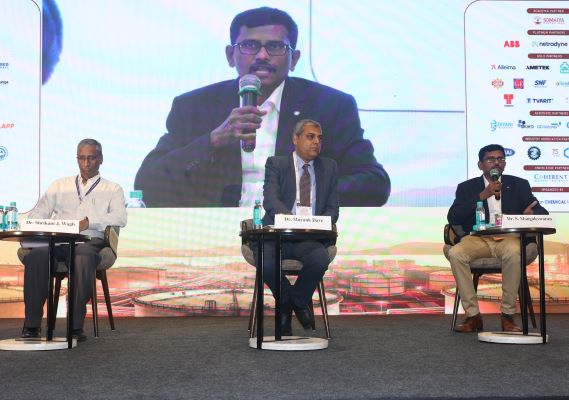Lab innovations are crucial in the chemical industry, enabling advanced applications that drive efficiency, reduce environmental impact, and promote sustainable growth

Lab innovations play a pivotal role in driving breakthroughs that enhance process efficiency, improve product quality, and reduce environmental impact. By integrating cutting-edge technologies and sustainable practices, chemical labs not only accelerate research and development but also support the industry's transition toward greener, more responsible manufacturing, making innovation, practical application, and sustainability inseparable pillars of future success.
Leading industry experts discussed the latest scenario at the tenth session, 'Lab Innovations, Applications, and Sustainability’ at the maiden edition of Chem & Petchem Conference 2025 organized by the Indian Chemical News on May 07-10, 2025 at Baruch in Gujarat.
The session was moderated by Dr. Mayank Dave, Head of Quality, Galaxy Surfactants who outlined the challenges in the laboratories and how the lab processes could be streamlined with latest innovations.
Dr. Shrikant J. Wagh, Provost, UPL University of Sustainable Technology
“A laboratory is a relatively small area as compared to manufacturing plants. It is a confined space where the safety challenges and exposure to chemicals are a bit more to the personnel working there. The new age laboratory innovations can enable a much more efficient and sustainable ecosystem.”“When safety norms are followed in the laboratory, it helps in the shop floor as well. Gone are the days when we used just volumetric titrations and conventional lab practices. Now there is lab automation and advancements in lab techniques besides the adoption of latest technologies. Now theAI technologies could be used in the laboratory equipment with incorporation of proper data. Since huge data is available on research sites, our computer engineers can use it to make AI tools which in turn can be used as training machines for automation and analysis to reduce the safety points. These can be later taken up to the shop floor then we can reduce the safety issues as well. Although these are AI technologies but the natural intelligence has a huge role to play in using them. A computer engineer cannot make or operate an AI tool for a chemical laboratory alone as he has to fall back on a chemical expert because domain expertise is important to run a technology. Therefore, we have started the interdisciplinary PhD program at our university where we have a chemistry person who can work on chemical engineering topics and vice versa. We have also collaborated with the computer science department so that they can use their AI-ML expertise to develop laboratory tools. We will have to let go of the old lab tools and adopt the new AI based lab technologies and practices as in the near future we will have a lot of hazardous materials. Infact, we will have to design a new laboratory for hydrogen with 3D software as we have to do quantitative risk assessment. Industry must come forward to support the academia for constructing such labs and help such research take place.”
Dr. S. Mangaleswaran, Head R&D - Green and Sustainable Chemistry, DCM Shriram Innovation Centre
“Earlier the documentation used to happen via a notebook but now e-Laboratory books have been widely adopted by many industries. It is being shared by different stakeholders including laboratory members, technicians, technology partners etc. Compared to earlier times when it was a big deal, now the knowledge integration is much faster. Digitalization enables us for a faster product development cycle and AI is enabling our innovation process. In material development, there are a lot of AI plus image processing and knowledge integration that fastens the overall product development cycle and helps us in many ways. In terms of building awareness, we should teach our current and future generations with a lot of digital literacy and integrating AI with chemistry. The ecosystem for decarbonisation was not fully developed a decade earlier but now with focus on sustainability, things are shaping up in a much better way. However, we are still far behind Europe in terms of competency gaps, cost sensitive business models and adopting new technologies. But with the right technology partners and developing the right chemistries, we achieve a lot. Using bio-based materials we can create new processes and it will take time to shape the technologies. A lot of unique projects are underway at our company as well as other companies and organizations. The product development is happening as a stage gate process and every such process has sharing of knowledge across teams. In terms of lab infrastructure, we will slowly see that all the batch processes will get transformed into continuous processes. Over the period of time, we will see a lot of digitization and automation of laboratories and these are the upcoming trends.”
The Chem & Petchem Conference 2025 themed 'Viksit Gujarat: Visit Bharat@2047’ witnessed massive attendance by leading industry experts and stakeholders across Gujarat and India. The 12 sessions at the two day event were attended by a total of 76 speakers and more than 600 delegates.
The conference was supported by Academia partner - Somaiya Vidyavihar University; Platinum partners -- PremierTech Systems & Automation, ABB India, and Netradyne; Gold partners - Tvarit GmbH (Germany), SNF Flopam India, Alleima India, AMETEK Land Instruments International, BEIL, UPL University of Sustainable Technology, Forbes Marshall, Utthunga Technology, Syinfotech, Servilink Systems, Graphite India, Thermax, Gem Machinery & Allied Industries and Thermax; Associate partners - Diyani Automation, Flaminia Ecarb India, LAPP India, Goodrich Gasket, and GD Waldner; Industry Association partners - Gujarat Chemical Association (GCA), Jhagadia Industries Association (JIA), Dahej Industries Association (DIA) and Alkali Manufacturers Association of India (AMAI).
Subscribe to our newsletter & stay updated.